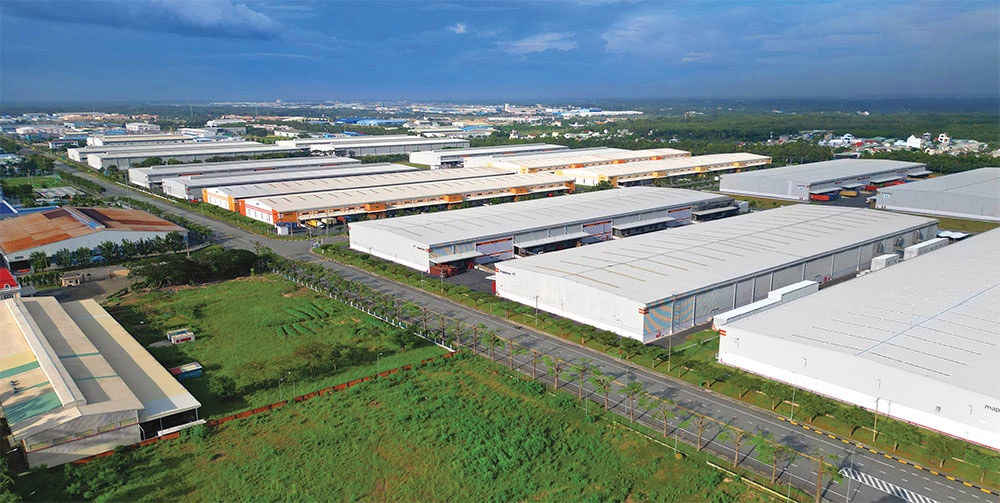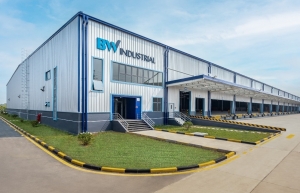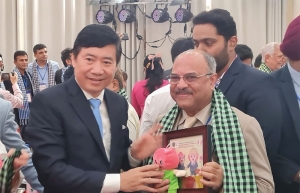Industrial arena blooms with activity
On November 10, BW Industrial Development JSC started construction on Vinh Loc 2, a double-story warehouse in the Mekong Delta province of Long An, its ninth project this year. The facility is set to be completed by the end of 2024 within Vinh Loc 2 Industrial Park (IP).
 |
One day earlier, SEA Logistics Vietnam commenced the development of SLP Bac Ninh Logistic, located in Thuan Thanh II IP in Thuan Thanh district of the northern province of Bac Ninh. This project is also expected to be completed by the end of 2024 and will provide modern logistics facilities, delivering comprehensive solutions to meet the evolving demands of the market.
Elsewhere, Indochina Kajima in October pre-opened its Core5 Factory Village in the northern port city of Haiphong. Located in DEEP C 2 IP, the complex is strategically located and boasts environmentally sustainable planning.
Frasers Property Vietnam (FPV) and GELEX Group jointly broke ground on the Industrial Centre Yen Phong 2C in Bac Ninh in September, to mark their first industrial and logistics project in North Vietnam since the signing of a partnership agreement in March. The centre is scheduled to be completed in the second quarter of 2024 and will feature high-quality industrial and logistics space designed in accordance with FPV’s premium estates concept.
Meanwhile, Singapore’s Sembcorp Development, a wholly owned subsidiary of Sembcorp Industries, and its state-owned joint venture partner Becamex IDC Corporation announced the addition of four new VSIPs in August.
The same month, Lineage Logistics also announced a joint venture with SK Logistics, a cold-storage warehouse operator based in Hanoi.
According to Brooke Miller, Lineage’s Asia-Pacific president, the cooperation with SK Logistics presents a significant opportunity to deliver top-tier cold storage solutions in the region while partnering with a successful family-owned business. “The partnership aims to support diverse customers, including supermarket chains providing food for families,” Miller said.
In July, Sumitomo Group from Japan signed an MoU with the north-central province of Thanh Hoa to develop an IP with an investment of $400 million. They are also considering developing a large IP in Nam Dinh province in the north.
According to a report released in October by Savills Vietnam, IPs nationwide have an occupancy rate of over 80 per cent, with the southern key provinces reaching the highest one with more than 90 per cent.
Regarding supply, by October, Vietnam had almost 400 IPs established with a total land area of approximately of 123,000 hectares. Of these, over 290 are in operation and the remainder are still being built.
Despite a large additional supply, rents still increase. In the north, rental prices rose by 30 per cent, reaching an average of $138 per sq.m per rental period, from $102 last year.
In large industrial provinces in the south, rent increased from $152 last year to $174 per sq.m this year. Binh Duong, Dong Nai, and Ho Chi Minh City have very high occupancy rates of at least 95 per cent.
John Campbell, deputy director and head of Industrial Services at Savills Vietnam said, “Currently, only Long An and Ba Ria-Vung Tau have vacant spaces for rent, with occupancy rates of 85 and 78 per cent, respectively. The market is thirsty for new supply, especially in Binh Duong, Dong Nai, and Long An.”
According to data from the Foreign Investment Agency under the Ministry of Planning and Investment, as of October 20, foreign direct investment in the processing and manufacturing sector continued to lead, reaching nearly $18.85 billion, accounting for around 73 per cent of total registered investment capital and increased by 45.8 per cent over the same period of last year.
Hoang Hai, director of the Department of Housing and Real Estate Market Management under the Ministry of Construction, pointed out that the trend of shifting industrial real estate investment capital flows of multinational corporations into Vietnam in the past made the demand for IP real estate shift to positive growth in 2023.
“Notably, industrial real estate in the north has high demand from the electronics sector, while in the southern region it is in the vehicle, garments and textiles, and packaging manufacturing,” Hai said.
Duong Thuy Dung, managing director of CBRE Vietnam, said that due to limited land in hotspot provinces, industrial real estate investors had proactively expanded their portfolios to second-tier markets.
“Thanks to the movement of tenants to the secondary market, the northern market is also attracting many large investors to expand production and business facilities. Going forward, the northern or southern regions will continue to be a huge attraction for the industrial real estate market,” Dung added.
 | Industrial developer can offer supply chain boost for Vietnam As of the end of September, Vietnam has attracted new foreign direct investments (FDI) exceeding $20 billion for 2023, up 4.5 per cent on-year, indicating that the country's appeal to international investors has not diminished. |
 | Industrial real estate developers ready to seize on economic rebound As Vietnam's economy is forecast to rebound in 2023, industrial real estate developers are looking to capitalise on opportunities in the market. |
 | Dong Thap boosts investment attraction for industrial zones Aside from availing of the strengths of its agricultural economy, the Mekong Delta province of Dong Thap is sparing no efforts to ensure effective investment attraction into local industrial zones to spur socioeconomic development. |
What the stars mean:
★ Poor ★ ★ Promising ★★★ Good ★★★★ Very good ★★★★★ Exceptional
Related Contents
Latest News
More News
- Construction firms poised for growth on public investment and capital market support (February 11, 2026 | 11:38)
- Mitsubishi acquires Thuan An 1 residential development from PDR (February 09, 2026 | 08:00)
- Frasers Property and GELEX Infrastructure propose new joint venture (February 07, 2026 | 15:00)
- Sun Group led consortium selected as investor for new urban area (February 06, 2026 | 15:20)
- Vietnam breaks into Top 10 countries and regions for LEED outside the US (February 05, 2026 | 17:56)
- Fairmont opens first Vietnam property in Hanoi (February 04, 2026 | 16:09)
- Real estate investment trusts pivotal for long-term success (February 02, 2026 | 11:09)
- Dong Nai experiences shifting expectations and new industrial cycle (January 28, 2026 | 09:00)
- An Phat 5 Industrial Park targets ESG-driven investors in Hai Phong (January 26, 2026 | 08:30)
- Decree opens incentives for green urban development (January 24, 2026 | 11:18)

 Tag:
Tag:





















 Mobile Version
Mobile Version